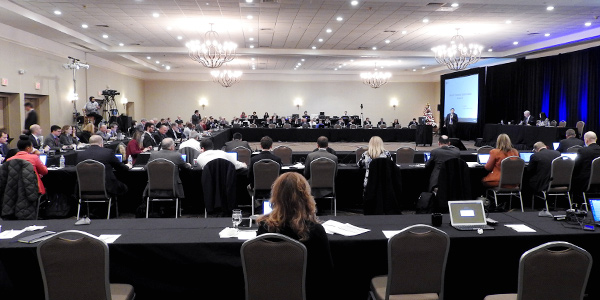By Rory D. Sweeney
CAPS Concerned About FTR Changes
WILMINGTON, Del. — Ten Consumer Advocates of the PJM States (CAPS) members signed onto a letter urging PJM’s Board of Managers to let “that process play out” concerning analysis of the RTO’s financial transmission rights market and any subsequent rule changes, CAPS Executive Director Greg Poulos told stakeholders and staff at Thursday’s Markets and Reliability Committee meeting.
While the other five manual revisions on the agenda were approved by group acclamation, Poulos asked that the revisions to Manual 06: Financial Transmission Rights, developed as part of the manual’s annual review, be voted separately. They were approved with one objection and seven abstentions.
PRD Review for Capacity Performance Requirements
Stakeholders endorsed revisions that would align PJM’s price-responsive demand (PRD) rules with the Capacity Performance construct. While three proposals developed by the Demand Response Subcommittee were potentially under consideration, the voting didn’t get past the main motion, which received 3.72 in favor in a sector-weighted vote with a 3.34 threshold. The MRC vote was accepted in the subsequent Members Committee meeting, moving it on to the board.
The main proposal requires PRD to reduce load in winter like other CP resources and will leverage existing load reduction and capacity nomination rules already approved by FERC for demand response. The status quo does not require winter load reduction, similar to PJM’s rules for DR prior to CP. (See “Summer-only Demand Response,” PJM MRC/MC Briefs: Oct. 25, 2018.)
An alternative initially developed by Calpine proposed using performance assessment intervals (PAIs) to trigger performance assessments, bonuses and penalties instead of using them only when appropriate real-time LMPs are greater than the PRD energy price, which the endorsed proposal uses.
Susan Bruce, representing the PJM Industrial Customer Coalition, voiced support for a proposal from the Independent Market Monitor because it allows PRD to be based on summer load-reduction capability rather than year-round. The Monitor’s proposal would not require PRD to reduce load in the winter if the customer’s load is already low and would use the old DR measurement and verification method to meet the CP annual requirements, which was updated based on CP and subsequently approved by FERC.
Surety Bonds
Exelon representatives, who had initially introduced one of the proposals to use surety bonds as a form of credit, called for deferring a committee endorsement on two proposals until a special PJM board committee reports on its investigation of the historic GreenHat Energy FTR default. The proposals were developed at the Credit Subcommittee. (See “Surety Bond Use,” PJM Market Implementation Committee Briefs: Oct. 10, 2018.)
The main motion would allow surety bonds as collateral for all market purposes, except FTRs, with a $10 million cap per issuer for each member and a $50 million aggregate cap per issuer. Exelon’s alternative proposal would allow surety bonds as collateral for all market purposes, with a $20 million cap per issuer for each member and a $100 million aggregate cap per issuer.
Some members were concerned about considering the proposals while the board’s investigation continues and because insurance companies can investigate claims against surety bonds prior to paying on the claims. PJM staff echoed previous assurances that the surety bond agreement language is designed to require immediate payment of claims, identical to the requirements of letters of credit, which are already approved forms of credit. While some of the language came from other RTOs/ISOs, it remains untested legally, staff said.
Both proposals will be reconsidered at the Dec. 20 MRC meeting. PJM CEO Andy Ott said representatives of the special committee will call in to provide an update on the investigation.
Gas Pipeline Contingencies
Load-side preference won the day for an alternative developed by the D.C. Office of the People’s Counsel to PJM’s proposed rules and compensation plan for handling supply-constraint contingencies on gas pipelines.
The main motion endorsed by the Market Implementation Committee, which was originally developed by Calpine, would have allowed units switching fuels at PJM’s direction to recover specific costs through a formula rate to be developed and filed with FERC. It would have been based on costs associated with fuel switching, exemptions from PJM performance charges during the fuel switch, and procedures for seeking cost recovery. (See “Gas Pipeline Contingencies,” PJM Market Implementation Committee Briefs: Nov. 7, 2018.)
Calpine’s David “Scarp” Scarpignato offered an amendment to remove gas pipeline penalties from the rate, which was accepted as friendly. He said it would be “untenable” for generators to potentially incur tens of millions of dollars in costs during an emergency and not be able to recover them.
The OPC’s alternative allows for cost recovery to be filed at FERC by the generation owner. Bruce supported this proposal, noting concerns about what could be included in rates developed through the main motion and how they would be audited. She said her members agree on the fundamental ideas behind the main motion but would be “behind the blocks” in having to file complaints about recovery charges rather than the generator having to seek recovery.
Poulos said his members also supported the OPC proposal and expressed “a lot of frustration” that discussion of the proposals received “short shrift” at the upper committees, as it was scheduled for first reads and votes at both the MRC and MC on the same day.
“I think that the risk of putting forward an inadequate proposal is greater than the risk of going one more winter without it,” said Panda Power Funds’ Bob O’Connell, announcing that he planned to oppose all the proposals.
The main motion failed, receiving 3.13 in favor in a sector-weighted vote with a 3.34 threshold. The OPC alternative was endorsed, receiving 3.77 in favor. It received 4.26 in favor in a subsequent endorsement vote at the MC.
RPM Credit Requirement Reduction Clarifications
In the MC, attendees agreed to move proposed credit-related Tariff revisions to the consent agenda, where they were endorsed with no objections. The revisions remove an apparent overlapping credit reduction provision for qualified transmission upgrades in order to clarify milestone documentation requirements for internally financed projects and that capacity market sellers should submit requests for reductions.
Committee Elections
Attendees also elected nominees to the Finance Committee, sector whips and American Municipal Power’s Steve Lieberman, representing the Electric Distributor sector, as vice chair of the MC for 2019.
Elections to the Finance Committee were:
- The D.C. OPC’s Erik Heinle, from the End-Use Customer sector;
- Jeff Whitehead, representing Eastern Generation, from the Generation Owner sector;
- Credit Suisse’s Marguerite Miller, from the Other Supplier sector; and
- Virginia Electric and Power Co.’s Jim Davis, from the Transmission Owner sector.
The tenures will all expire at the end of 2021. Tenures for the current representative from each sector on the committee expire either next year or in 2020, including the tenures for both representatives from the Electric Distributor sector.
The sector whips were Old Dominion Electric Cooperative’s Adrien Ford, from the Electric Distributor sector; the PJM ICC’s Bruce, from the End-Use Customer sector; Gabel Associates’ Michael Borgatti, from the Generation Owner sector; Direct Energy’s Marji Philips, from the Other Supplier sector; and Exelon’s Sharon Midgley, from the Transmission Owner sector.
Bilateral FTR Retraction
PJM CFO Suzanne Daugherty announced PJM’s plans not to follow up on additional information requested by FERC in a recent FTR-related filing and instead pushed to have it withdrawn. The MC voted in favor of showing its agreement with PJM’s plan, but not without Shell Energy voicing its disagreement. The acclamation vote passed with six objections and 11 abstentions.
In the previous week, FERC approved two of four filings — and rendered moot a third — that PJM made in response to the GreenHat default. On the fourth filing related to bilateral FTR transactions, the commission issued a deficiency letter requesting more information. Shell and several financial traders protested the filings. (See FERC OKs Key PJM Changes to Address GreenHat Default.)
Shell’s Matt Picardi said his company protested to raise the issue of the underlying indemnification and that addressing the deficiency letter is important for hashing out those issues.
Daugherty responded that “Shell has been very straightforward” with its opinion, but that its interpretation of the indemnity provision differs from PJM’s. Staff would prefer to pull that back to discuss it in the stakeholder process because it was never addressed there, rather than hash it out at FERC.
“There was some discussion around the edges” of the indemnification issues during the GreenHat talks earlier this year, Picardi said. He said Shell would engage in any stakeholder processes on the topic but would not be “foreclosing” on its “other options” to push the issue.
Daugherty confirmed that PJM has no expectation of submitting another filing on the issue other than to have the discussion.
Stakeholders Approve Variety of Actions
Stakeholders endorsed by acclamation several manual revisions and other operational changes:
- Manual 03: Transmission Operations. Revisions developed to update the generator voltage schedule with new processes that require transmission owners to verify and submit voltage schedules via eDART, generation owners to review the schedules and the eDART contact to acknowledge the schedule. This will all need to be done annually. (See “Generator Voltage Schedule,” PJM Operating Committee Briefs: Nov. 6, 2018.)
- Manual 10: Pre-Scheduling Operations. Revisions developed as part of a periodic cover-to-cover review.
- Manual 14D: Generator Operational Requirements. Revisions mirroring those of Manual 03 above.
- Manual 27: Open Access Transmission Tariff Accounting. Revisions developed as part of the biennial review.
- Manual 11: Energy & Ancillary Services Market Operations. Revisions developed as part of ongoing revisions to the day-ahead timeline. (See “Day-ahead Market Timeline Manual Changes,” PJM Market Implementation Committee Briefs: Nov. 7, 2018.)
- Revisions to the day-ahead scheduling reserve for 2019. The 2019 calculation of 5.29% is a 0.01-point increase from the 2018 requirement. Endorsed with seven abstentions and one objection. (See “Day-ahead Scheduling Reserve Recommendation,” PJM Operating Committee Briefs: Nov. 6, 2018.)







